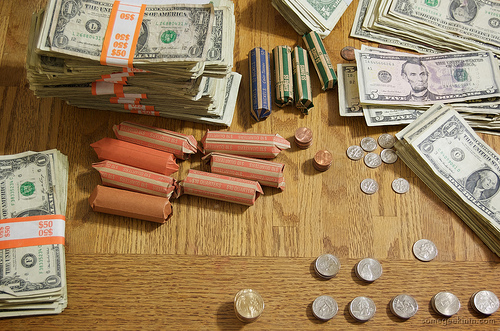Every budgeting website will tell you over and over again to save money for emergencies, and this post will be no different. Having a savings account is crucial for your future, to say the least. I can’t even begin to tell you how much I regret not learning to manage my money until I was in my 20s, and how I wish I would have put more effort into saving more of what I was making when I was in high school and college. When I was younger, my income felt pretty disposable because I didn’t really have to worry about paying bills and supporting myself (I was a commuter during my last two years of college, so my parents basically took care of all of my living expenses). I spent my money on nights out with friends and designer bags and accessories. I couldn’t for the life of me figure out why adults were always complaining about never having enough money, because it had never been an issue for me.
You would think that I’d get my reality check when I moved out into my first apartment, but that wasn’t the case. I lived with my boyfriend, and we divided up our monthly bills according to what we could each afford (and I’ll always be appreciative of the fact that he didn’t expect my preschool teacher’s salary to compete with his double-Master’s degree salary). I had less money to spend frivolously, but we still lived comfortably. My real slap-in-the-face came when my student loans went into repayment (which is a whole different story in itself). I quickly realized I had been doing it all wrong, and I struggled to live paycheck to paycheck for the next year while I learned to manage my money the right way. After a lot of trial and error, I finally feel like I have a firm hold on my finances.
Have you been in the same boat? For me, it was really hard to know where to begin. Yes, I wanted to start saving money, but I had no idea how much I should be saving, let alone how much I could actually afford to put aside without putting myself into more debt in the process. The standard that people recommend having in an emergency fund is generally 3 to 6 months’ salary. For some reason, that number blew my mind and seemed infeasible to me. I barely made any money, and at least half of it was already going to student loan payments. Where was I going to come up with the extra cushion for my account, and how could I save and still afford to pay my bills?
Save what you can. If you can only afford to save $50 per month, then work with that! Don’t put as much as you can into savings only to have to use your credit card to pay for other things you need (which is what I did frequently – not smart). It totally defeats the purpose.
Build slowly over time. No one said you had to come up with this money overnight, but that’s how I interpreted it – I thought I had to have it put aside right now in case some sort of disaster struck tomorrow. While that would be nice, it doesn’t exactly happen that way since it’s more than likely that you have other things to put money towards, such as bills and living expenses. While your cushion may look small to begin with, it will grow over time with your continued commitment to saving every month, slowly but surely. You might be tempted to spend it, but treat your savings contribution as a payment to yourself, just like any other.
Pass on what you know. I really wish my parents had talked to me more about handling my money on my own and being financially smart. If I could go back and tell my college-self anything, it would be to put more money aside in savings because you’re going to need it for way more important things in just a few years. Others, especially younger people just starting out, can definitely learn from your mistakes and hopefully use that knowledge to their advantage.
I’ve successfully saved for some upcoming vacations, special events, and (hopefully) our first home, all while maintaining a general emergency fund WITHOUT needing to use my credit card OR sacrificing a little bit of fun every now and then. Honestly, it feels really great to be in control of my money and know that I’m pretty prepared in case anything should happen unexpectedly. Are you confident in your ability to save? Share your story with us! You can also find a few more tips on how to save money here.

